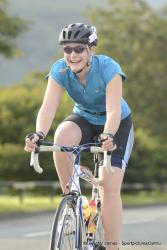Using âself-talkâ as part of your endurance sport training? Hereâs what you need to know
New research suggests how you can get the edge over your competitors in endurance sport
 You have probably caught yourself muttering some encouragement to yourself, perhaps when you were facing a particularly difficult physical challenge, or experiencing some sort of stress; âCome on, you can do this!â or âI know I can do this!â
You have probably caught yourself muttering some encouragement to yourself, perhaps when you were facing a particularly difficult physical challenge, or experiencing some sort of stress; âCome on, you can do this!â or âI know I can do this!â
Sports psychologists have now found that speaking to yourself in the second person: âYou need to dig deep!â, is actually more effective than speaking to yourself in the first person, âI need to dig deep!â
In a piece of just-published research () sports psychology researchers at Âé¶ṗṀḋÃẄẁßÇåḞæ found that participants told to use the second-person pronoun âyouâ when encouraging themselves while cycling created a superior power output than those told to use the first person pronoun âIâ.
This was the first study to show that how athletes use self-talk makes a difference. The research could provide coaches and others with a new element to consider when developing effective self-talk interventions.
James Hardy of the Universityâs School of Sport, Health and Exercise Sciences and one of the paperâs authors explained:
âSports psychologists have long known that self-talk can be useful for aiding enhanced performance. However, nothing was  known about the way that a subtle grammatical difference in self-talk, using first (âI can do thisâ) or second (âYou can do thisâ) person pronouns, can effect performance; that is, until our recent research.â
known about the way that a subtle grammatical difference in self-talk, using first (âI can do thisâ) or second (âYou can do thisâ) person pronouns, can effect performance; that is, until our recent research.â
âThere are of course different types of tasks associated with sports and much less is known about endurance tasks, which is why we applied this to cycling.â
âOur findings from 16 active males indicate that second person self-talk generated significantly greater power output and faster time-trial performance than first person self-talk. Interestingly, the participants did not report noticing any difference in ratings of perceived exertion. So they were able to do more work but didnât notice any difference in workload.â
This is the first evidence that strategically using grammatical pronouns when implementing self-talk can influence physical performance providing practitioners with a new aspect to consider when developing interventions.
Publication date: 9 July 2019
